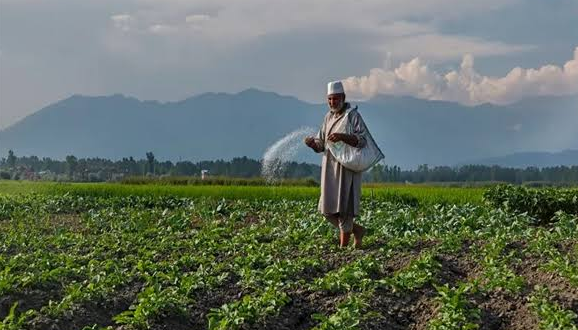A Deep Dive into Integrated Farming System for Doubling Farmers Income in Kashmir
Integrated Farming System (IFS), a holistic vision is a novel agricultural paradigm that aims to integrate diverse farming activities within a single frame work
Post by Dr. UZMA BASHIR on Friday, September 1, 2023

REVOLUTIONIZING AGRICULTURE
Nested in the lap of nature, the Kashmir valley is embarking on a journey of agriculture transformation that holds the promise of doubling farmer’s income by adoption of Integrated Farming System (IFS). This innovative approach seeks to harness the synergies between different agricultural activities, presenting a roadmap towards more sustainable and profitable farming approach.
Integrated Farming System (IFS), a holistic vision is a novel agricultural paradigm that aims to integrate diverse farming activities within a single frame work. In the context of the Kashmir valley, this involves the seamless integration of crop cultivation, animal husbandry, pisiculture and allied enterprises. By synergizing these elements, fosters a self sustaining ecosystem, where the benefits are greater than the sum of its parts, farmers can maximize resource utilization, reduce production risks, increase their income and minimizes waste.
Unveiling the Mechanism of Transformation of Integrated Farming System
- Income Amplification: Integrated farming infuses diversity into income streams. While crops form a core, livestock and fish farming bring consistent revenue, cushioning farmers from the vagaries of market fluctuation.
- Resource Optimization: The inter play between different components optimizes resource utilization. By products from one activity becomes resource for another, minimizing waste and fostering a self sustaining agricultural cycle.
- Risk mitigation: Diversity within the system acts as a buffer against risks. If one aspect faces challenge, other picks up the slack, ensuring a resilient income even in the face of adversity.
- Resource Efficiency: Recycling nutrients and reducing waste are inherent to integrated systems. This eco-system practise not only conserves resources but also promotes sustainable agricultural practices that align with the regions fragile ecosystem.
- Synergistic growth: The synergy between different elements translates into higher productivity. Livestock waste enriches the soils for crops, while crop residue becomes fodder for animals. This interconnectedness elevates yields and economic returns
- Empowerment through Diversity: Training farmers in managing diverse enterprises empowers them with a brooder skill set. This knowledge equips farmers to make informed decisions and adapts to changing conditions.
Glimpse of Integrated Farming system into the future of Kashmir
In Kashmir future of agriculture in integrated farming system approach could bring about transformative change, picture farms where crops, livestock’s and agro-forestry co-exists harmoniously fruitful synergies between these elements would not only enhances productivity but also address sustainability challenges.
Farmers might cultivate a variety of climate resilient crops, such as fruits, vegetables and grains, leveraging traditional and modern knowledge. These crops would be strategically intercropped to optimize space and resource use. Livestock, including poultry, goats and dairy cattle would complement crop activities by providing manures for organic fertilization and additional income through milk, meat, and eggs.
Agro forestry would grace and landscape with carefully selected trees and shrubs offering shade, conserving moisture, and fostering biodiversity. These trees bear fruits, nuts or timer, further diversifying farmers revenue sources. The integration of these components would be guided by data driven precision agriculture techniques. Farmers might use smart sensors, drones and predicative analytics to monitor soil moisture, nutrient levels, and crop health. This tech-savvy approach would ensure optimal resource allocation and reduce waste. Local communities would thrive as cooperative models. Knowledge exchange would flourish, traditional wisdom blending seamlessly with modern innovation. Agri –tourism could bloom, offering visitors a chance to experience this holistic farming first hand.
Implementing integrated farming system in Kashmir requires overcoming challenges with capitalizing opportunities. Tailored training programme and capacity building initiatives can bridge the knowledge gap. Access to markets, credit facilities and government support will be instrumental in scaling up integrated farming practices. The unveiling of the integrated farming systems potential in the Kashmir valley marks a significant step towards transforming agriculture and improving the livelihood of farmers. The holistic approach not only has the power to double farmers income but also to create a more resilient and sustainable agricultural sector in the region, with proper support training and collaborative, the integration of various farming activities can pave the way for a brighter future for farmers in the valley, while contributing to food security and economic growth at large.
In future, agriculture in Kashmir would not only feed the population but also inspire sustainable practices beyond its borders. The landscape would be a mosaic of thriving farms, an ode to the successful integration of nature’s bounty and human ingenuity.
(The Author is working as Sr. Soil Scientist at KVK Srinagar (SKUAST-K))